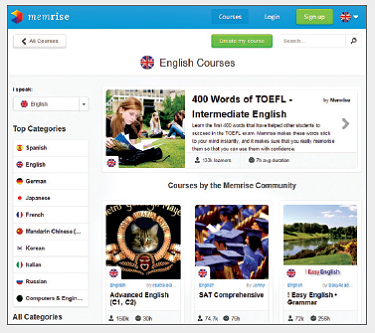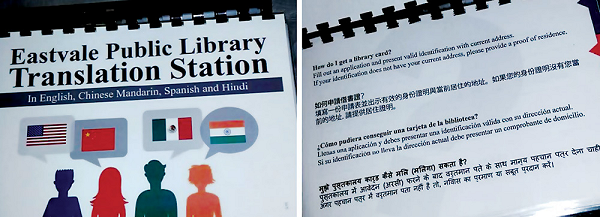Tablets for Translation
Google Translate has several other tricks up its sleeve for mobile devices. It can facilitate a smooth conversation between speakers of select languages. It can recognize handwritten characters traced on a device’s glassy face. But it can only do this on mobile devices. Should librarians be relied on to bring their own smartphones to the reference desk? Or is it time to make tablet computers among the tools at every library point of service?
“Are you kidding?” remarked one poster on the California Libraries Facebook page. “What libraries have the funds to equip staff with digital devices or allow their use in assisting the public?!”
It turns out, tablets are not that expensive. ConsumerSearch.com recently compiled some Tablet Computer Reviews (consumersearch.com/tablets) that offer guidance on tablet quality. Apple’s iPads (apple.com/ipad) come out on top here in whatever model they are offered. The Samsung Galaxy Tab (samsung.com/us/mobile/galaxy-tab) is the favorite Android-based tablet. Although iPads can run more, most of these tablet styles cost less than $500. The new Android-based Fire HD tablet from Amazon drops the prices to from $129 to $229. Also, when not being used for translating services, these tablets can be employed for roaming reference or to scan barcodes for inventory.
Live Program Translation
Nicole Pasini, library services manager of community libraries at San Mateo County Library, asks, “Related question: Has anyone ever used translation equipment (i.e., headsets you’d give to non-English speakers that would allow an interpreter to do simultaneous translation at a program/event/meeting)?”
Funny you should ask. In October 2015, the internet telephony app Skype debuted its real-time translator service for voice and video calls (skype.com/en/translator-preview). The idea is that Skype will show in its Windows app (or those for Android or iOS devices) near real-time translation subtitles for voice and video calls in English, French, German, Italian, Mandarin, or Spanish.
If the library filmed its programming, sending it out over Skype Translator, wouldn’t it be possible for audience members to get in on the call to receive enlightening subtitles?
ESL ToolsLearning English is hard. As we librarians work to communicate with our patrons who speak languages other than English, we can also introduce them to tools that can help them become more comfortable in“our magnificent bastard tongue.” The language learning program Rosetta Stone is famous but expensive. A free alternative is Pittsburgh’s Duolingo (en.duolingo.com), available as a website and as an app for Android or iOS. Users can learn English through the Spanish, Italian, or Portuguese portals. A more open-source model comes from Memrise: English Courses (memrise.com/courses/english/english). This site collates free online courses written by the “Memrise Community,” including an English visual dictionary and “The 400 Words of TOEFL.” Over the years, several good-hearted ESL teachers have posted their lessons to the web. Although the sites look old-fashioned, they still contain hearty lessons for those struggling to learn English. These include ESL Café: For Students (eslcafe.com/students), which offers tests and pronunciation assistance; the EnglishClub.com (englishclub.com) out of Cambridge; and EnglishPage (englishpage.com/index.html), which features tests and tutorials about the finer points of English gerunds and conditionals. 
Memrise collates ESL lessons written by community members. |
Other Translation Services
As a member of the Microsoft family, Skype is powered by the Microsoft Translator, a statistical machine translation platform and web service developed by Microsoft Research, as its back-end translation software. This same platform also powers the Bing Translator (bing.com/translator) that can be used on the web or on iOS, Android, or Windows phones. Bing Translator can be downloaded to an Apple or Android-based watch for wrist-based interactions. As of October 2015, Bing Translator offers translations in 51 languages.
At 20 years old, an ancient age for the web, Babelfish lives on, now offering to translate 75 languages. SYSTRAN itself freely offers to translate your phrases on its web interface.
Those who need human intervention in a translation can try Unbabel (unbabel.com). For a modest fee, the translated document will be proofread and corrected by a native speaker. Also, users can request a tone: one appropriate for business or one that is less formal.
If you have only a short phrase that you would prefer to have translated by a human, you can try visiting the /r/Translator subreddit board on Reddit (reddit.com/r/translator). You’ll get your translating done and you’ll look hip, too.
The Human Touch
Madelyne Palafox, branch manager of the Eastvale Public Library in California’s Riverside County, writes:
We created a translation station at our library branch. We have a large Chinese Mandarin, and Hindi speaking population over here in Eastvale and Google Translate wasn’t the easiest for many of our patrons who didn’t speak any English.
We wrote down all of our FAQs, and asked our community to help us translate the entire document. It is now a flipbook with the questions in English, Spanish, Mandarin, and Hindi. We later used this same volunteer based method to translate our library card applications and signage around the library. It’s been working marvelously for us!
Palafox did not spontaneously grab her volunteers off the street to force them to start translating for her. “I was awarded an LSTA grant last year to make changes to our branch that would help our diverse patron population feel welcome,” she explains, “The grant included funds for growing our foreign language collection, creating signage in foreign languages, the translation station, translating our library card applications, and putting on some cultural programming. The small changes amounted to so much appreciation from the community that I was able to get all of these documents translated for free from our patrons!”
The developing city of Eastvale is now the highest income city in Riverside County, and more than 60% of its homes include children under the age of 18. “We will be getting a brand new library building in the next couple of years, as our patronage is quickly outgrowing our current hours and building capacity. It’s great to work in a community with citizens so invested in their local library.”
The translation flipbooks, located at each circulation desk, are designed to help the staff explain library policies to users. “The majority of its usage is with our older populations,” explains Palafox. “A large portion of the adults in the community are immigrants who sometimes don’t speak a word of English. The translation station allows us to communicate and help those patrons to the best of our abilities!”
Translation, whether it is human or machine-generated, facilitates free access to information. And that is what public libraries are all about.

The Eastvale Library in California used volunteers to create flipbook “translation stations.”